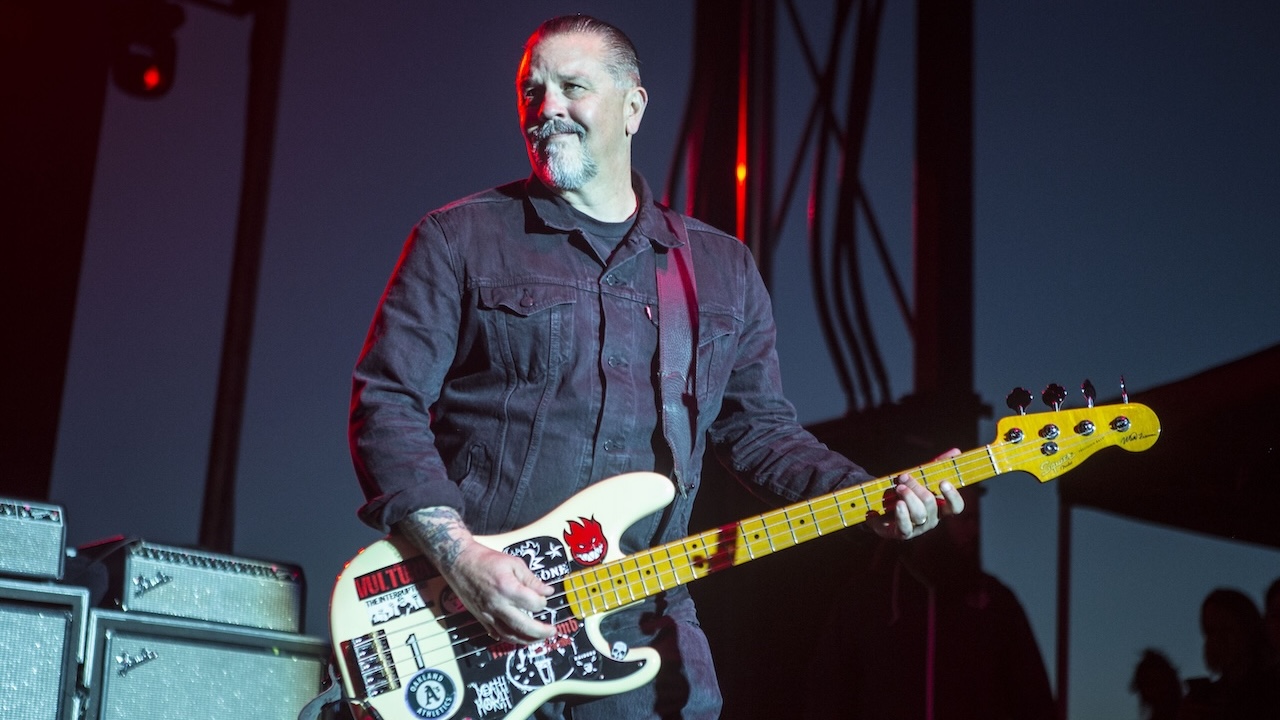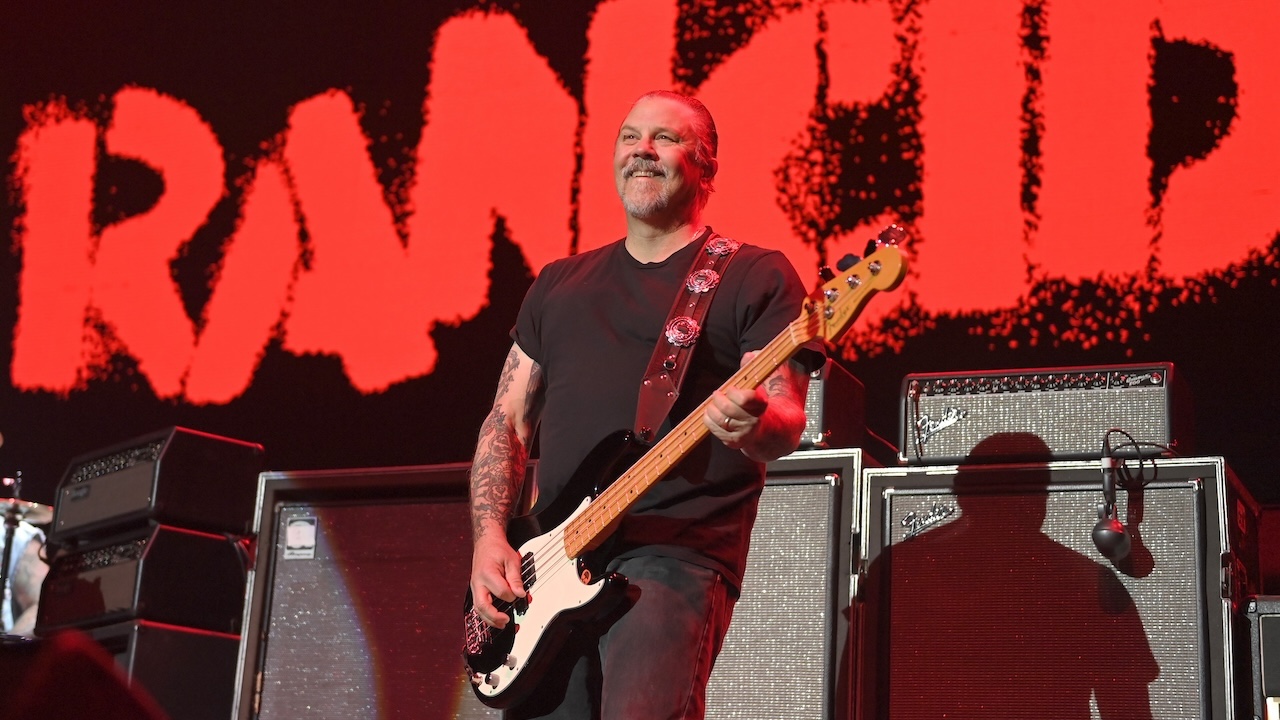
Oh, to be Rancid. Mixing high-energy punk with the infectious, quick-time bounce of second-wave ska, the brazen foursome from Berkeley, California, continues to do things their way. That's apparent the moment you cue up Tomorrow Never Comes, the band’s 10th studio album. Freeman's bass screams as he gooses his band's turbocharged ska with tight turns and high-speed thrills.
Live, his picking prowess is nothing short of breathtaking. Dialling in a burnished tube tone and latching onto drummer Brett Reed like a clenched fist, Freeman weaves aggressive walking lines and monstrous flatpicked fills into and around guitarists Tim Armstrong's and Lars Frederiksen's pounding, lock-step rhythms.
“The Who's Live at Leeds turned me onto bass,” Freeman told Bass Player, explaining the genesis of his take-no-prisoners approach. “And the first Specials record got me into ska. Still, X is probably my favorite band of all time.”
“John Doe is amazing; his bass guitar is pretty buried on those early records, but if you listen closely you'll hear all this walking stuff moving in and out of chords. 99% of Rancid songs have a walking bassline in there somewhere.”
Among punk-rock bass players, Freeman is a bit of an anomaly. His basswork on nascent punk anthems such as Maxwell Murder and the rolling ska grooves of Time Bomb set him far apart from the root-pounding horde.
And while terms like “scalar runs” and “chromatic movement” might elicit a dismissive sneer from some of his contemporaries, Freeman cautiously cops to such musical awareness.
“I've been playing music since I was seven. I took lessons, and I learned to read charts in my high school jazz band. But I found out a long time ago there's no committee that decides if you're doing things right. Play what you wanna play – you'll know what sounds good.”
The following interview from the Bass Player archives took place in August 2009.
How do you foster your continual growth as a bass player?
“I listen to music in a lot of different ways. Sometimes I put it on in the background, and other times I focus in on a bass or drum part. I try to take influences from everywhere.”
Where does the melodic aspect of your playing come from?
“I really don't know. But think about all the music you've listened to throughout your life. Growing up, my mom constantly played Carol King's Tapestry. I heard one of those songs on the radio the other day, and listening to the bass parts, I thought, ‘I've played like that!’ Those kind of musical memories are in your brain. When I write and play, I try to let myself go to access it.”
How do you get yourself in shape to play fast?
“I try not to think about it. I pick the strings up near the neck, which helps with speed. It helps get your wrist going. Plus, I use medium-thin Dunlop picks.”

How do you guys make sure your song-writing is at its best?
“Most Rancid songs are acoustic before they're anything else, with Tim on his old Fender acoustic and me on my Guild B-50 acoustic bass guitar. We've been doing that for years.”
What else informs your playing?
“Growing up, I had a great bass teacher named Jeremy Cohen – he still teaches in Berkeley and plays all over the place. He was great at homing in on fundamentals. Plus, I'm a big John Entwistle fan.
“Sure, he played a lot of crazy basslines, but he really utilized the instrument for what it is. I'm an aggressive rock player, but at the same time I love old-school bass – using the instrument like only it can be used.”
Your solo on Maxwell Murder has become a mainstay of Rancid's live shows. What goes through your mind at that point in performance?
“I always have an idea of what I'm going to do with that bass solo, but I try to just throw as hard as I can and let it fly.”
Tell us about your studio setup.
“I still use a '77 P-Bass, which I bought in 1984 for $400. It's funny; with all the gear I've gotten over the years, my studio setup cost me less than $700! But I don't take any of that on tour anymore. It's like driving a '65 Chevy cross-country –stuff's going to break!”
What are some of the vintage basses you've collected?
“I've bought a few other ‘77 P-Basses, but nothing's really stuck. I've got a ‘66 Precision and a ‘74 P-Bass that used to belong to Rudy Sarzo. I also have a couple of ‘77 Fender Jazz Basses and a ‘77 Rickenbacker.
“During Life Won't Wait, I played a ‘78 Music Man StingRay. They've all seen time with Rancid – I really try to play them all. I look for ‘players’ rather than collector pieces, because they’re cheaper and more worn in.”
What advice would you give to bass players?
“Take what you do very seriously, and work hard at it. It doesn't matter whether you solo; you're the bass player, the bottom – you drive the band. When I was growing up, everyone said, ‘Oh, bass is just a second guitar.’ Bullshit! It's an art, man! We should all be proud to be bass players.”







